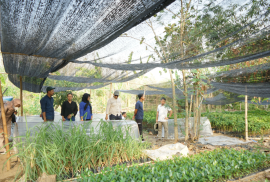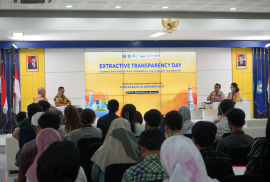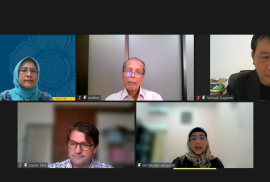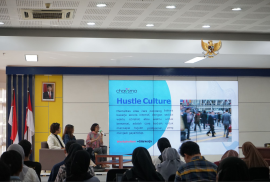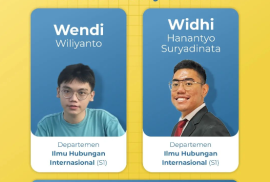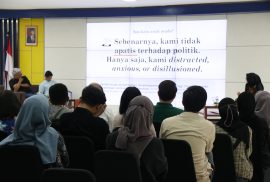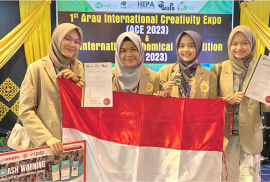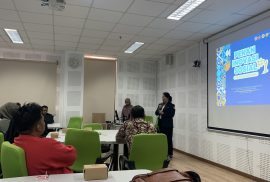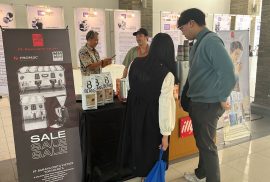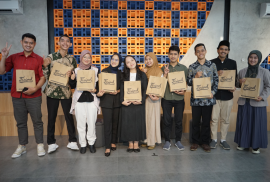Yogyakarta, October 17th 2023─Faculty of Social and Political Sciences UGM collaborated with Faculty of Forestry and Pertamina Foundation for community service to carry out the function of Getas-Ngandong KHDTK, in Ngrawoh Village, Blora Regency on Tuesday (17/10). The event was attended by Vice Rector of UGM for Student Affairs, Community Service, and Alumni, Arie Sudjito; Dean of Faculty of Social and Political Sciences Wawan Mas’udi; Pertamina Foundation representative, Dio; UGM Faculty of Social and Political Sciences officials; as well as the Head of Village and Ngrawoh Village officials. The UGM team from the Faculty of Social and Political Sciences arrived at Ngrawoh Village at 11:00 am to conduct a kick-off related to the empowerment plan for the Getas-Ngandong KHDTK community. This activity is the opening of a series of future activities related to forest area management to reforest and prosper the community.
Yogyakarta, October 16th 2023─As part of a series of events launching the Extractive Data Portal managed by the Ministry of Energy and Mineral Resources (KESDM) as the Secretariat of the Indonesian Extractive Industries Transparency Initiative (EITI), the event “Extractive Transparency Day: Extractive Industries Towards Just Energy Transition” was held on Monday (16/10). The organization of this event was the result of collaboration between various parties, namely the Research Center for Politics and Government (PolGov) Faculty of Social and Political Sciences UGM; Ministry of Energy and Mineral Resources (KESDM); Publish What You Pay (PWYP); and Indonesian Ideas and Analytics (IDEA). The event was held offline at the Mandiri Auditorium Fisipol UGM.
Yogyakarta, October 16th 2023─The Hamas attack on Israel launched on Saturday (7/10) reignited the Palestinian-Israeli conflict. The political tension has existed since 1917 and has claimed millions of lives. Various peace efforts through the UN and other third parties have also not produced results. This time, the DIHI Talks series by the Department of International Relations, Faculty of Social and Political Sciences UGM, in line with the goal of world peace in SGDs 16, raised the issue under the title “Hamas-Israel 2023: A New Chapter of Middle East Conflict or Peace” on Friday (13/10).
Yogyakarta, October 11th 2023─CDC FISIPOL UGM welcomed World Mental Health Day on October 10 by holding a series of activities through Mental Health Society 2023. A talk show themed “No Hustle, No Future: How to Develop Resilience in A Hustle Culture” opened the week of health events held on Wednesday (11/10) at Fisipol Auditorium. Through the talk show attended by Clinical Psychologist – Ernawati Widyaningsih, M.Psi., Psychologist, Mother of Bhumi Bhuvana – Bukhi Prima Putri, and mental health fighter – Maygsi Suwadi, S.Sos., M.A. CDC invited them to better understand mental health.
Yogyakarta, October 9th 2023─Wendi Wiliyanto and Widhi Hanantyo Suryadinata, two undergraduate students from the Department of International Relations (DIHI), made achievements in the ASEAN-Korea Academic Essay Contest in 2023. Through an essay entitled “Green Energy Transition in ASEAN-ROK: The Nexus of Circular Economy Principles and Digitization on Waste Management”, Wendi and Hanan won the merit prize and are entitled to a prize of 500,000 won.
The idea of the essay written by Wendi and Hanan came from their concern about the gap between digitization of waste management and circular economy. “We are deeply honored. We are happy that our ideas on circular economy and waste management digitization were well conveyed to the jury,” said Wendi.
Yogyakarta, October 5th 2023─Digitalization has now penetrated various fields, including politics. However, it needs to be examined whether digitalization has been balanced with digital literacy in responding to it. This is because digital intelligence is sometimes still not optimally utilized to support the acceleration of the quality of life. Welcoming the 2024 General Election in the midst of the digital era, DMKP Fisipol UGM held a seminar in the framework of the 68th Anniversary of FISIPOL UGM on Thursday (05/10) at the Auditorium of Fisipol UGM with the theme “Election Transformation of 2024: Digital Intelligence as a Catalyst for Change”.
Yogyakarta, October 5th 2023─A team of students from Master of Public Administration of UGM made a proud achievement in the Arau International Creativity Expo (ACE) 2023, an international competition held by World Invention Intellectual Property Associations (WIIPA) and Center of Excellence Geopolymer and Green Technology (CEGeoGTech), Universiti Malaysia Perlis (UniMAP). In this prestigious competition, the student team won the gold medal through the DASH WARNING innovation.
Motivated by the awareness of the huge impact of sexual harassment in society, the team consisting of Amanda Elista, Defy Rizky Ramadhany, Sania Octa Priscilia, and Sinta Novia created the DASH WARNING application that enables the use of technology to provide proactive solutions to prevent sexual harassment. The innovation offered by DASH WARNING won the gold medal and competed with 252 teams from 10 countries.
Yogyakarta, October 3rd 2023─In order to welcome the 63rd Karang Taruna Bhakti Month, Creative Hub FISIPOL UGM together with Karang Taruna D.I. Yogyakarta held a Youth Festival Bootcamp entitled Social Innovation Week at FISIPOL UGM on Tuesday (3/10). The boot camp was attended by the Chairperson of Karang Taruna DIY, Gusti Kanjeng Ratu Hayu and Deputy Dean for Research and Community Service, Cooperation, and Alumni, Fina Itriyati, Ph.D., as well as 20 innovators spread across 5 regencies/cities in D.I. Yogyakarta as the leading sector of social innovation ecosystem development.
Yogyakarta, October 3rd 2023─The international community has approved the concept of sustainable development goals (SDGs) as a strategy to respond to change. The use of natural resources, education, food security, and responsible production and consumption are some of the targets that must be achieved by countries in the world. Indonesia itself has tried to pour the concept of SDGs into each of its policies. Supporting the implementation, various professions, including art activists, voiced the sustainability aspect in “Malioboro Coffee Night” at Faculty of Social and Political Sciences of UGM from October 2nd to 3rd, 2023.
Yogyakarta, September 27th 2023─In the third year of the implementation of Fisipol 3 Minutes Thesis (3MT), the selection stage managed to attract dozens of undergraduate and graduate students from various faculties at Universitas Gadjah Mada (UGM). Ten finalists were selected from the undergraduate and graduate categories and then participated in the 3MT final event on Wednesday (27/9). In his speech, Dean of Faculty of Social and Political Sciences UGM, Dr. Wawan Mas’udi, appreciated the good purpose of organizing this competition. “In order to build a culture, especially among undergraduate and postgraduate students, to be able to convey confidently what they think and the results of their research well as part of forming effective public speaking,” Wawan explained. He believes that good research results are not only about the methods and findings, but also how research can bring impact to society. FISIPOL 3MT is a place to communicate research results in a compact and concise manner so that it can be understood by the general public.

